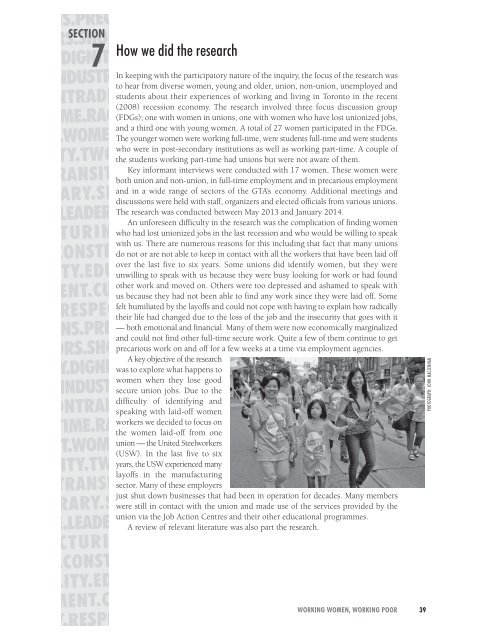workingwomenworkingpoor_letter_web
workingwomenworkingpoor_letter_web
workingwomenworkingpoor_letter_web
Create successful ePaper yourself
Turn your PDF publications into a flip-book with our unique Google optimized e-Paper software.
SECTION7How we did the researchIn keeping with the participatory nature of the inquiry, the focus of the research wasto hear from diverse women, young and older, union, non-union, unemployed andstudents about their experiences of working and living in Toronto in the recent(2008) recession economy. The research involved three focus discussion group(FDGs); one with women in unions, one with women who have lost unionized jobs,and a third one with young women. A total of 27 women participated in the FDGs.The younger women were working full-time, were students full-time and were studentswho were in post-secondary institutions as well as working part-time. A couple ofthe students working part-time had unions but were not aware of them.Key informant interviews were conducted with 17 women. These women wereboth union and non-union, in full-time employment and in precarious employmentand in a wide range of sectors of the GTA’s economy. Additional meetings anddiscussions were held with staff, organizers and elected officials from various unions.The research was conducted between May 2013 and January 2014.An unforeseen difficulty in the research was the complication of finding womenwho had lost unionized jobs in the last recession and who would be willing to speakwith us. There are numerous reasons for this including that fact that many unionsdo not or are not able to keep in contact with all the workers that have been laid offover the last five to six years. Some unions did identify women, but they wereunwilling to speak with us because they were busy looking for work or had foundother work and moved on. Others were too depressed and ashamed to speak withus because they had not been able to find any work since they were laid off. Somefelt humiliated by the layoffs and could not cope with having to explain how radicallytheir life had changed due to the loss of the job and the insecurity that goes with it— both emotional and financial. Many of them were now economically marginalizedand could not find other full-time secure work. Quite a few of them continue to getprecarious work on and off for a few weeks at a time via employment agencies.A key objective of the researchwas to explore what happens towomen when they lose goodsecure union jobs. Due to thedifficulty of identifying andspeaking with laid-off womenworkers we decided to focus onthe women laid-off from oneunion — the United Steelworkers(USW). In the last five to sixyears, the USW experienced manylayoffs in the manufacturingsector. Many of these employersjust shut down businesses that had been in operation for decades. Many memberswere still in contact with the union and made use of the services provided by theunion via the Job Action Centres and their other educational programmes.A review of relevant literature was also part the research.PHOTOGRAPH: JOHN MACLENNANWORKING WOMEN, WORKING POOR 39


